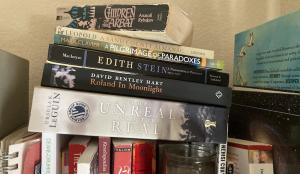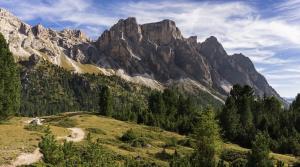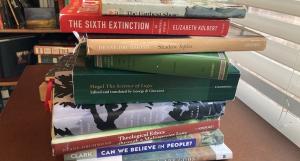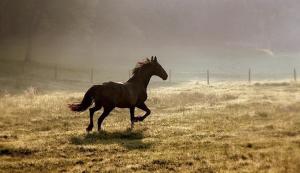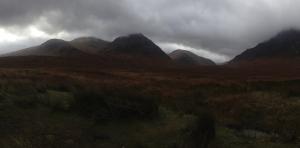
Those who have been reading this column will be aware of my summer adventures in the U.K. With the help of a grant for seminary professors like us, my wife and I had the privilege of wandering from the southern edge of England all the way to Edinburgh, Scotland. On the train north I alternated between watching the landscape and, just because I’m a dreamy romantic, reading about Francis Osbaldistone’s journey through the same lands in Sir Walter Scott’s Rob Roy.
I love Scott because I love a good swashbuckling adventure story. This particular novel had long been on my list for genealogical reasons. Much of my family comes from the regions which serves as its setting. My grandfather’s family even stems from Clan MacGregor, the outlaw heroes of the story.
Here comes, predictably, a theology-infused reflection on the novel.
Rob Roy
Rob Roy follows young Francis’s journey north, after his London mercenary father sends him packing to the family home in Northumberland. He soon discovers that a cousin is swindling his father’s wealth and simultaneously fomenting rebellion across the northern border. So he travels further, into Glasgow and then the highlands, in an attempt to restore his father’s wealth and reputation.
Along the way, inevitably, he falls in love, has his honor challenged, and finds himself beset by swordsmen. He meets some strange and some very funny companions. His path crosses more than once with Rob Roy and his wife Helen, the only person in the story whom even Rob, the feared reiver and warrior, lives in awe of.
The gray misty highlands loom in the background of the whole story, hinting that there is wild mystery just beyond the edges of the known and trusted world. His is an adventure of “much risk and labor,” Francis says in the book’s opening. Risk, in fact, may be the key idea of the whole. The revolutionaries, the calculating businessmen, the cattle drivers, and Francis himself all look out on a wild and unpredictable world, and have to decide what they are willing to risk as they step out into it.
Sunday Morning in Glasgow
A Presbyterian worship service, unexepectedly, collects these elements in a single eerie moment. Francis has gone, because all the town has gone, to Sunday service at the old cathedral in Glasgow. Scott takes several pages here to tell us about the walk toward the “gloomy and massive” church, then the architecture without and within. The Reformed service takes place below, in an expansive crypt, for reasons which are lost to Francis. Nearly everything, in fact, is strange to him. The dress of the congregation: highland kilts mixed with lowland suits. The style of the sermon: intellectually rigorous without any emotion at all.
Understandably, his mind wanders during the second or third dry point of the Calvinist homily. He hears a steady drop of water behind him, and begins to realize just how cavernous the crypt is, with graves and tunnels spreading out into unfathomable distance beyond him.
“Such is the pleasure our imagination receives from the attempt to penetrate as far as possible into an intricate labyrinth, imperfectly lighted, and exhibiting objects which irritate our curiosity, only because they acquire a mysterious interest from being undefined and dubious.”
The gothic crypt, like the highland hills, is a dubious and mystery-laden sprawl of shroud, damp darkness, and risk. We’re barely even surprised when, in the midst of the sermon, Francis hears a whisper from the darkness behind him. “You are in danger in the city.”
Literature as Natural Theology
As with all good adventures, it’s what Francis experiences, and who he becomes along the way, that makes the story. He sets out, entirely sure of himself, only to discover the foolishness of such inexperienced self-assurance. He’s like Odysseus, Alice, Bilbo Baggins, and so many others who have journeyed there and back again to discover what they could never have learned at home. (See the guiding metaphor of my latest book!)
I think of good literature as a sort of natural theology. Natural theology is a category of thought that begins not with divine revelation but with the observable world that gives itself to our experience. From there it proceeds to discern what it can about the divine shaper of things.
What excites me most in this book, theologically, is Scott’s sense that wild and fathomless mystery is the very structure of the world. Francis is not studying theology, but he is studying the world. And the connection between the two is in fact hinted at in the opening paragraph of the book. “The Disposer of human events,” Francis writes to his friend, has sent him these adventures to give shape to rest of his days.
This giving of shape suggests to me the metaphor of Russian nesting dolls. If God is the mother of all reality, then those realities will be shaped analogously to God. A dark and mysterious world is precisely what we would expect to encounter in a world crafted by the God of Moses, Job, and the Apostles. We think we know, starting out, all we need to know. Only then do we encounter labyrinthine crypts and looming mountains. Not to mention highland clans whose sense of honor and justice come from an entirely different universe than the economic contracts of London merchants.
The Disposer of Human Events
Years later, an aging Francis Osbaldistone realizes he cannot tell his own story without telling the story of the crypt, the mountains, and his days as Rob Roy MacGregor’s traveling companion. The Disposer of human events, too, has revealed himself in all this. Not in direct ways, but rather in the shape of Francis’s life, in his memories, and in all those risks.
“What have I not yet discovered about God?” is a question that hovers over–and is given shape by–a question like “what have I not yet discovered about myself and my world?” And that just strikes me as good theology. Life puts us on journeys, literal and metaphorical. From these journeys we learn the world and ourselves. We never discover, for either nested reality, all there is to know. Misty gothic darkness lurks ever deeper around the known horizons of self and world.
And in these adventures of discovery, we are learning the shape of the whole. The Disposer of human events, it turns out, is shaped something like a swashbuckling adventure into the highlands. A place where risk and mystery and loyalty all collide at once and leave us breathless.


